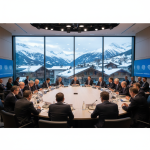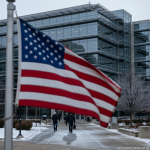In early November, Vishen Lakhiani, a prominent CEO, encountered an unexpected intervention at Miami Airport when FBI agents questioned him despite his holding a valid O-1 visa, which is intended for individuals with extraordinary abilities. This incident has sparked widespread discussion around the legal grounds for such an intervention and its broader implications on both national security and the integrity of the U.S. visa system.
Lakhiani, of Indian descent and CEO of an American firm, was returning from an international business trip when he was detained for questioning by the FBI on the grounds of verifying his travel and business activities abroad. Such actions by federal authorities highlight ongoing national security measures and the scrutiny applied to individuals on specialized visas like the O-1. According to reports, Lakhiani described the experience as bewildering and indicative of broader systemic xenophobia within U.S. immigration enforcement.

The O-1 visa is specifically designed to attract international talent in fields like science and technology, known for stringent selection criteria that acknowledge an applicant's extraordinary capabilities. However, recent years have seen increased scrutiny over potential abuses and fraud within this category, with authorities aiming to balance attracting global expertise against potential threats posed by misuse of immigration pathways. The New York case involving alleged malpractice offers a stark reminder of these concerns.
Key Facts and Timeline: What Happened at Miami Airport?
Lakhiani's detention at the Miami airport unfolded rapidly. Arriving on a direct flight from Kuala Lumpur, he was approached minutes after disembarking. Detained for nearly four hours, federal agents pursued details about his recent trips to European and Asian markets, examining his professional role in his firm, Mindvalley. Despite his valid O-1 status, the questioning centered on verifying adherence to U.S. immigration rules.
This operation appears part of a broader push to tighten oversight on foreign executives working in critical sectors, amidst growing anxieties about industrial espionage and misuse of privileged visa categories. The intersection of these areas often thrusts business leaders into complex legal terrains.
The Broader Context: U.S. Visa Policy and National Security
U.S. visa policies, particularly those catering to professionals, have historically fluctuated in response to domestic labor market demands and national security imperatives. The post-9/11 era saw heightened vigilance, and in recent years, concerns around intellectual property and technology transfers added complexity to the narrative. Homeland Security officials stress the necessity of this diligence, especially concerning fuelling innovation safely within American borders.
The situation with Lakhiani coincides with broader dialogues about reforming high-skilled immigration streams to ensure they continue to deliver talent while safeguarding against fraud. The push for efficiency must address the risks of exploitation without stifling the inflow of talent crucial to economic vitality and technological advancement.
Stakeholder Insights: Industry and Policy Reactions
Industry leaders argue that overly stringent checks may negatively impact the attractiveness of the U.S. as a business hub. Technology firms, many of whom rely on global talent, fear a chilling effect on their operations. They cite Canada's welcoming policies as indicative of potential strategic realignments in global mobility patterns.
Meanwhile, government officials highlight the importance of checks to protect national interests. Yet, they acknowledge the need to streamline these processes to ensure fairness and transparency. The bipartisan sentiment recognizes high-skilled immigrants as vital contributors to the innovation economy while contending with the operational complexities governing visa adjudication.
The Road Ahead: Balancing Innovation and Security
As debates around tighter visa regulation intensify, stakeholders advocate for nuanced approaches that reflect global business realities while ensuring critical security checks are not bypassed. The Lakhiani case may serve as a touchstone for ongoing policy dialogue, highlighting the need for reforms that balance rigor with flexibility.
The evolution of these frameworks will likely shape the competitive landscape, influencing the U.S.'s appeal to top-tier innovators worldwide. It's a journey of complexity, where recalibration involves not just regulatory shifts, but broader cultural conversations on immigration's role in national identity and economic strategy.
"The heart of an innovation-driven economy beats strongest when barriers to talent are effectively managed, leaving no room for exploitation but ample space for opportunity."









